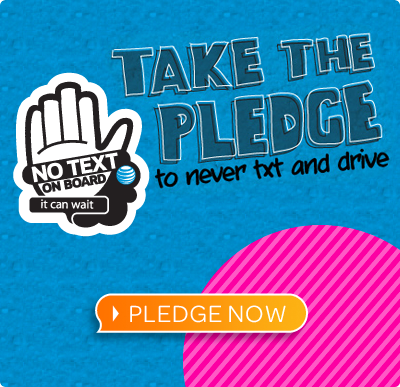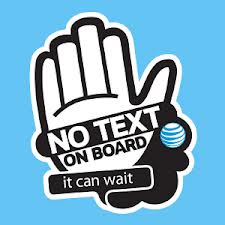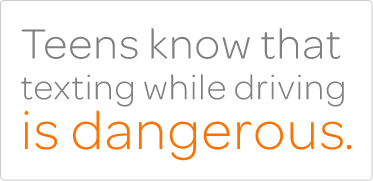 Feb. 4, 2015 Update! Tomorrow on Blog Talk Radio, impaired survivor of texting and driving Liz Marks shares her truth in a powerful show to get teens to LISTEN about putting down the phone.
Feb. 4, 2015 Update! Tomorrow on Blog Talk Radio, impaired survivor of texting and driving Liz Marks shares her truth in a powerful show to get teens to LISTEN about putting down the phone.
Lauren Galley of Girls Above Society hosts, with special guest and Shaping Youth ally Diana Graber of Cyberwise.org.
Important topic that impacts us all. I plan on tuning in with my teen and hope it will be archived to spread widely.
Original Post: Sept. 19, 2012 “It can wait.” Really. Txt me l8r, k? 4now, Jst Drv! Today National Organizations for Youth Safety (NOYS) team up with mobile giant AT&T to implore all ages to take the pledge to NEVER text and drive, because facts prove: no text is worth the risk.
What’s that you say? Too late, you’ve already fudged?
Hear ya, and so do all the AT&T powerhouse partners like MADD participating in a huge awareness and social media push to put the brakes on NOW and screech to a hard stop with a lifelong commitment.
Sure, I signed the pledge, tweeted, shared, cajoled, reminded, and deep dived the entire Stop The Texts, Stop the Wrecks.org NHTSA/Ad Council site too…AND reviewed their whole YouTube channel line-up of PSAs along with every major mobile carrier “no texting while driving” campaigns site… and yet?…Sadly, I’m pretty dang sure the 97% of teens polled that ‘know better but still do it’ and 75% that say it’s ‘common’ among their friends will continue to STILL do it, and that makes me want to lean my head on the horn with a loud, extended wail.
I’ve written about this topic extensively in, “Behind the Wheel Texting, What Works to Drive Behavior Change” noting how the mindset hopscotches right over the neuroscience and developmental risk-taking of teens and youth to land smack dab in the hypocritical parent posse square; as many slink down into their proverbial bucket seats busted. (yep, you know who I’m talking about…)
There’s no more Driver’s Ed in schools, so ‘don’t text and drive’ is often awol
unless something has already ‘happened’ at a school.
 Previously I interviewed Derek Baird, co-author of the Facebook for Educators.org Guide and creator of his own FREE downloadable “No Phone Zone Standards-Based Lesson Plan For Student Created PSAs” …
Previously I interviewed Derek Baird, co-author of the Facebook for Educators.org Guide and creator of his own FREE downloadable “No Phone Zone Standards-Based Lesson Plan For Student Created PSAs” …
Derek reminded, “My lesson plan won’t be as easy to find as a resource developed by AT&T, LG or everyone else who has jumped on board this issue. They have high profile campaigns, celebrity involvement and a myriad of other resources. I think what differentiates my lesson plan is that I have aligned it to McRELstandards, so it can be used in the classroom. This is where a lot of big brands fail in their outreach to educators. They provide great resources, but they don’t align them to state or national standards.”
Some orgs, like Project Yellow Light’s newly announced contest are putting youth behind the camera to convey their versions of PSAs, an informal learning version of Derek’s curriculum…
But every time I asked teens about whether schools are doing ‘media management assemblies’ or if they’ve incorporated any of the mobile safety/digital literacy life skills into lesson plans to add an exclamation point to the parent pressure, I hear next to none. Zip. Nada. Awol. I hope teachers discover and utilize this free gem and find a way to sneak it into their busy musts and mandates since he’s tied it to standards-based needs for the classroom, too!
I did find that brand-wise, AT&T was voiced as the main carrier ‘concerned’ about not texting and driving (informal poll, 20 teens at random) with FCC and DoT as national partners in the It Can Wait campaign, which is social media saturated and top of mind on today’s pledge day...plus, their mini-doc snagged mindshare during the Olympics run. My own teen cited the ‘brain damage’ video as being compelling, brave, and heart-wrenching. And it was. But that’s awareness, not motivation triggers to halt, “Shift, and Reset” as Brian Reich would say in his book about strategies for addressing serious issues in a connected society. Clearly more ideas need churned fast, because:
Awareness and facts are clearly there, behavior change is not.
From AT&T’s fact sheet (pdf):
- Those who send text messages while driving are 23 times more likely to be in a crash.2
- Of all cell phone related tasks — including talking, dialing, or reaching for the phone — texting while driving is the most dangerous.3
- In 2010, texting while driving increased 50% in one year, and two out of 10 drivers say they’ve sent text messages or emails while behind the wheel — despite a rush by states to ban the practice. 3
- When drivers read or send a text message, their reaction time is doubled. When asked to respond to a flashing light while texting behind the wheel, drivers were more than 11 times more likely to miss the light altogether.4
- 2 Virginia Tech Transportation Institute Research 3 The Pew Internet & American Life Project 4 Texas Transportation Institute
What WILL it take to make a dent in the mindset of ‘it won’t happen to me’ fear-formulas?
Incentives and rewards? (Insurance, parental, carrier or car?) I’ve seen everything from thumb bands touted by celebrities as ‘reminder’ gear to free apps like TextNoMore serving up half-off deals and rewards for powering down…
Simulators and first hand experience? (My favorite tactic is Belgium’s “must text to pass the driver’s test” hands-on spoof simulation by nonprofit Responsible Young Drivers, (at end) I’m eager to see AT&T’s new online simulation launching, as the traveling sim was a huge hit with teens everywhere) but again, my concern is awareness vs stopping.
GPS gear equipped to malfunction w/motion? (i.e. keystroke input tied to speed data; here’s more at Scientific American on this, though differentiating between public transit/passenger vs driver/motion/speed sensors could be an engineering challenge.)
Free apps like AT&T DriveMode or speech to text recognition apps? (like Drive Safe.ly created by iSpeech.org, which reads text (SMS) messages and emails aloud in real time and automatically responds without drivers touching the mobile phone, helping hands-free/social peer pressure immediacy but not necessarily the distraction, and…what about social media locks? Text input can be a tweet or a status line on smartphones too…There are tons of “apps aimed at stopping the texting and driving phenom, here are three more to peruse via Nationwide Insurance)
Parental controls that literally cut off teens remotely to refrain from texting while driving? (more about AT&T’s launch today, but c’mon, who will cut off the parents? I’d argue adults are not as adept at texting even at a standstill much less in motion, NO ONE should be driving and texting, so this needs a ‘universal remote.’)
Losing licenses and longer reach with longer arms of the law? (regulatory dust-ups with stiff reverb, primary vs secondary offense verbiage; with reckless endangerment/death in cases like this one, we sure need to get beyond ‘traffic infraction’ citations, ugh.)
Hackathons for fresh innovation? AT&T ran a hackathon with some gear-gizmo ideas like a ‘safe car key’ idea that keeps the phone out of the driver’s reach; similar to many GPS systems that won’t let you program in motion. Apps and ideas keep cranking out constantly, like this wild keystroke sensor in development called Rode Dog that BARKS at you when you text, arf!)
 So much of this has been ‘tried’ yet failed that it makes me smell a rat in the mobile/money vested interest part of the equation, which bears further scrutiny. I’ve been carping for years about why mobile carriers don’t just engineer and install an anti-texting device like a safety air bag.
So much of this has been ‘tried’ yet failed that it makes me smell a rat in the mobile/money vested interest part of the equation, which bears further scrutiny. I’ve been carping for years about why mobile carriers don’t just engineer and install an anti-texting device like a safety air bag.
(Sure, someone could hack it to disable, but how many times have you seen someone bother with uninstalling an air bag on the passenger seat? Not often.
AT&T has led the way with their “It Can Wait” massive collaborative effort, so I hope they’re the first carrier to make it mandatory and ‘just do it’ to mix branding metaphors.
The default could be safety. So why isn’t it?
(Seems it’s the same monetary driver that’s giving junk food companies carte blanche to create advergaming into apps to ‘engage’ kids and undermine parents/public health knowing full well they can’t be ‘on it’ in ‘guardian mode’ 24/7 with junior. See “Food Makers Hook Kids on Mobile Games” which I’ve been writing about since 2007 noting their subversive deployment deep inside the layers of virtual worlds as well as in mobile social hangouts, and gaming networks on multiple platforms via apps…it’s profitable, but conflicts with kids’ public health and well-being dialog.)
So why are we yammering about awareness and media literacy when we could go whonk with a hard, painful wrist slap leveraged like the size of a dictionary to engineer mobile devices that shut down in auto-mode? Cue The O’Jays tune please.
Forbes’ headline reads, “It’s Time for a Parental Control, No Texting While Driving Phone” which pointblank puts the onus on cellphone manufacturers and lawmakers to quit talking about it and ‘funding awareness’ and instead start DOING something about it that sticks. They write:
“…Imagine the new iPhone or an Android phone with a built-in, parental-locked, no-texting feature on the phone. Upon setup, parents lock the phone when it is traveling over a certain speed – the phone can even put an “I’m driving” auto-reply to all texts coming in. For our teens, who is typically paying for the phone? Parents. Parents would flock to purchase a safe phone for their kids – even paying extra for these features. We have kids in helmets to cross the streets these days. Parents will pay.”
I would. Would you? And the technology is there. We just need to put all the parts together. Time to put this very stuck shift into high gear. Or come up with some better ideas…We’ll be doing a Part Two with big thinker Brian Reich, author of Shift and Reset and Media Rules on fresh ways to tackle this conundrum and other societal woes impacting public health…
What are your ideas to ‘shift and reset?’
Teens ‘know better’ and so do parents. Awareness is not the problem. Behavior change is.
My favorite, humorous, hands-on spoof simulation (reprise) Responsible Young Drivers, Belgium.










Text and Drive recently became the #1 killer of teens in the US – more lethal than drunk driving. I think its starting to become clear that legislation has value in raising public awareness in forums like this one but it will be difficult to solely legislate our way out of this issue. I also read that over 3/4 of teens text daily – many text more than 4000 times a month. New college students no longer have email addresses! They use texting and Facebook – even with their professors. Tweens (ages 9 -12) send texts to each other from their bikes. Technology needs to be part of the solution and not dismissed as the villain.
I decided to do something about distracted driving after my three year old daughter was nearly run down right in front of me by a texting driver. Instead of a shackle that locks down phones and alienates the user, I built a texting asset called OTTER that is a simple and intuitive GPS based, texting auto reply app for smartphones. While driving, OTTER silences those distracting call ringtones and chimes unless a bluetooth is enabled. The texting auto reply allows anyone to schedule a ‘texting blackout period’ in any situation like a meeting or a lecture without feeling disconnected. This software is a social messaging tool for the end user that also empowers this same individual to be a sustainably safer driver.
Erik Wood, owner
OTTER apps (Since 2010. Free)
Thx, Erik, I’ll check out Otter…It’s definitely an ‘all hands on deck’ dilemma that needs addressed at every level from legislation to conversation to apps/edu/schools/parenting and beyond…Hope you’ll also tune in tonight to hear teen survivor Liz Marks share her story on Blog Talk Radio, as I find the first person storytelling continues to breakthrough with teens who have the “everyone’s doing it” mantra…until it turns into a gruesome ‘show and tell’…It’s sad they have to be impacted at a granular level, but we’ve found from gang reform to substance abuse, to any behavioral shifts and teen triggers, first person stories and experiences silence the room with rapt attention.
Here’s where the show is hubbed/archived w/our friends at Cyberwise.org speaking as well: http://www.blogtalkradio.com/laurengalley/2015/02/06/texting-driving-survivor-liz-marks-shares-her-story
I would love to share more about texting and driving along with the consequences in this video.
https://youtu.be/9XQ0zj28S_o?si=J3x7GLmdvDdaJ0ts